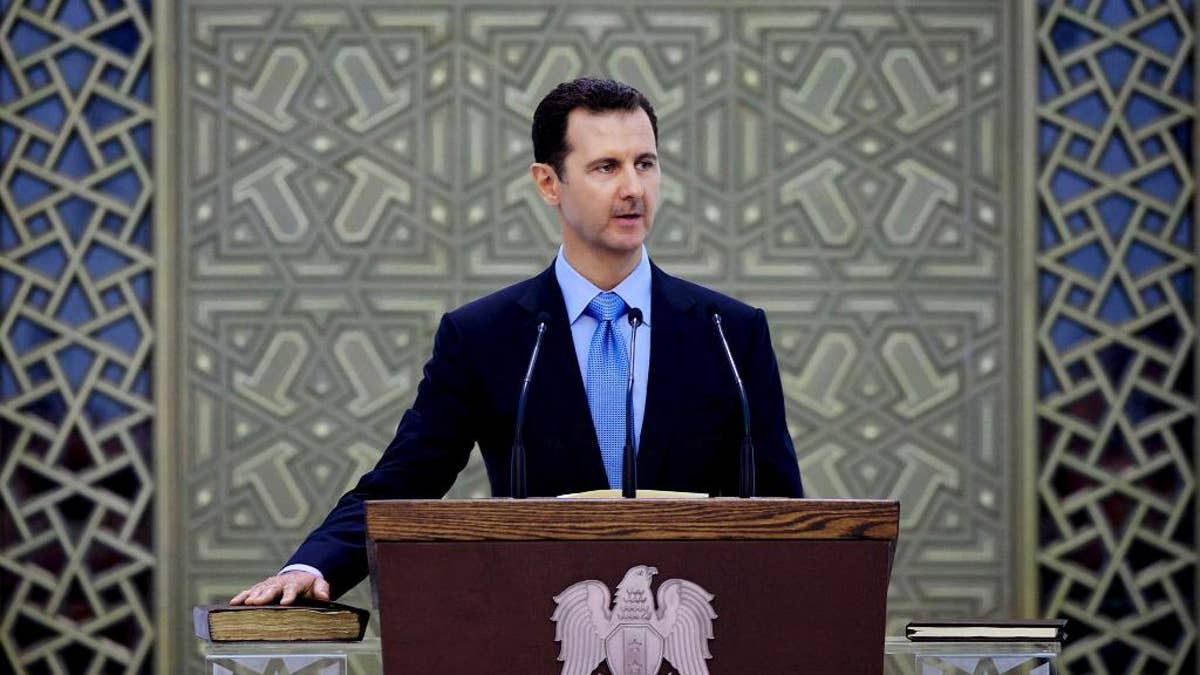
FILE - In this Wednesday, July 16, 2014 file photo released by the Syrian official news agency SANA, Syria's President Bashar Assad is sworn for his third, seven-year term, in Damascus, Syria. Assad said in remarks published Wednesday that U.S.-led airstrikes targeting Islamic State group militants in his country are neither serious nor efficient, claiming they have failed to produce any tangible results. (AP Photo/SANA, File) (The Associated Press)
There used to be a nation called Syria, as there used to be a nation called Iraq. It is almost meaningless now to speak of those states. They have disintegrated, and something new will likely arise in their places. Whether that something will be better, who can know?
In Syria—to use a term of convenience—more than 200,000 have been killed. More than 3 million have been made refugees. Through it all, the dictator, Bashar Assad, has remained on the throne. He has not let his father down. He has kept the family business going.
The father, Hafez, became dictator in 1970. He and his wife, Aniseh, had six children. The eldest surviving child was a daughter, Bushra, whom Hafez loved and admired. She would have become dictator—but she was of the wrong sex, so it had to be the eldest son, Bassel.
He was made for the dictatorship, it seemed: handsome, smart, confident, glamorous. They called him “The Golden Knight,” for his equestrian skills. The dictator adopted a new sobriquet, “Abu Bassel,” meaning “Father of Bassel.” The nation was being prepared for the Next One.
But on January 21, 1994, tragedy struck. It was a foggy morning, and Bassel was late to catch a plane. He was speeding in his new Mercedes coupe. In a traffic circle outside the Damascus airport, he hit a barricade and flipped several times. He died instantly, age 31.
So, the second son, Bashar, was called home. Called home from where? From London, where he was enjoying a residency in ophthalmology. He had never had any interest in power or dictatorship. Besides ophthalmology, his main interest was photography, apparently.
Unlike Bassel, Bashar was shy, nerdy, and awkward. An unlikely dictator. But that’s what he would be groomed to be. One minute, he was ensconced in the ophthalmological community of London. The next, he was studying tank tactics at the Homs Military Academy.
Hafez died in 2000, when he was 69. Bashar, at 34, took over. Years before, when he was seven, he entered his father’s office. He had had his first French lesson, and was bursting to tell his father about it. The next time he entered that office was after his father’s funeral, when he himself was dictator.
Bashar enjoyed a political honeymoon. The world was excited about this new Arab leader who had lived in the West. He liked Phil Collins, the British rock star. Enhancing the political honeymoon was a literal one: Bashar married an Anglo-Syrian beauty, Asma, who was featured in Vogue.
Before there was an Arab Spring, there was a Damascus Spring, presided over by Bashar. This was a brief period of liberalization. Wary of presiding over more, Bashar cracked down. And when the Arab Spring came in 2011, he cracked down even harder.
A civil war resulted, now in its fifth year.
Assisting Bashar is his brother Maher, a man with an infamous taste for killing. He has been dubbed, in Syria and abroad, the regime’s “thug-in-chief.”
Surely, Bashar Assad did not want to become the butcher and destroyer of Syria. He did not even want to become dictator. But he has done whatever is necessary to hang on to power, maintaining the family throne.
And in Syria, you might fairly say, it’s a case of kill or be killed. If Assad fell, the Alawite community from which his family comes would face slaughter.
The dictator and Asma have three children, the eldest of whom is a son, named after his grandfather. This second Hafez is now 13. For several years now, he has been talked about as the Next One.
Three Assads on the throne in Syria would be unlikely. But then, there have been three Kims in North Korea.
If it had been up to me, the United States would have hastened Bashar Assad from power in the heady days of 2011, and protected the Syrian masses from slaughter. It’s too late for that now. The country has been hollowed out.
The only thing to do now is to protect those innocents who can be protected, and see what takes the place of the countries we’ve known as Syria and Iraq.
Forces of decency should be backed wherever they can be found. Enclaves of civilization, or non-savagery, should be encouraged and bolstered. And the least awful options are sometimes the best you have.








































